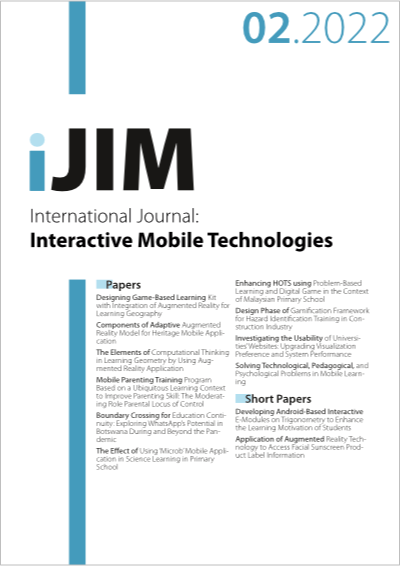Solving Technological, Pedagogical, and Psychological Problems in Mobile Learning
DOI:
https://doi.org/10.3991/ijim.v16i02.26205Keywords:
mobile learning, online learning, psychological and pedagogical barriers, psychology of mobile education, technologyAbstract
Aim/Purpose: This paper aims to explore the various problems associated with the technological, pedagogical, and psychological aspects of mobile learning and develop recommendations for its improvement. Background: Mobile learning becomes increasingly popular today. This type of learning is relatively new. It has recently gained popularity due to the pandemic restrictions in 2020. As mobile learning is being actively used, educators, students, and other professionals begin to note its positive and negative sides. Methodology: The study is based on the method of experiment as well as an online 11-item questionnaire was conducted (developed by authors) with 110 teachers in Russian universities (Russian State University named by A.N. Kosygina, I.M. Sechenov First Moscow State Medical University, and Kuban State Technological University). Contribution: The practical significance and prospects for further research are based on the possibility of using the results in further study of the problem of the impact of mobile applications on specific indicators. Findings: It was found that, given the great prevalence of mobile devices today, there is every reason to implement mobile learning at universities. However, there are infrastructural problems that prevent the widespread use of this mode of delivery (problems with the Internet, old gadgets that do not support 4G, lack of technical support, etc.). Teachers also mention a set of problems associated with the quality of such training, which are mainly related to pedagogical and psychological aspects of the process. About 56% of university teachers say that students often behave irresponsibly during online classes. They are inattentive, tend to skip lessons, and do not hand in the tasks, which leads to a decline of knowledge and failing at tests and exams. Around 68% of teachers have difficulties adapting their teaching methods to a mobile learning environment. Recommendations for Practitioners and Researchers: This study proposes structured recommendations to improve the quality of mobile learning by advancing technology skills, adapting mobile learning to the needs of universities, and raising the motivation of teachers and students. Impact on Society: The results of the study can be used to analyze and compare the impact of mobile learning on society, efficiency in various fields, as well as mobile learning of students on future employment and life in society. Future Research: In the future it will be important to conduct a comparative analysis of the impact of mobile learning on students and teachers, to study the effectiveness of such learning in general.
Downloads
Published
How to Cite
Issue
Section
License
Copyright (c) 2021 Alena Gura, Valentina Latysheva, Elena Mamlenkova, Olga Kolosova

This work is licensed under a Creative Commons Attribution 4.0 International License.



